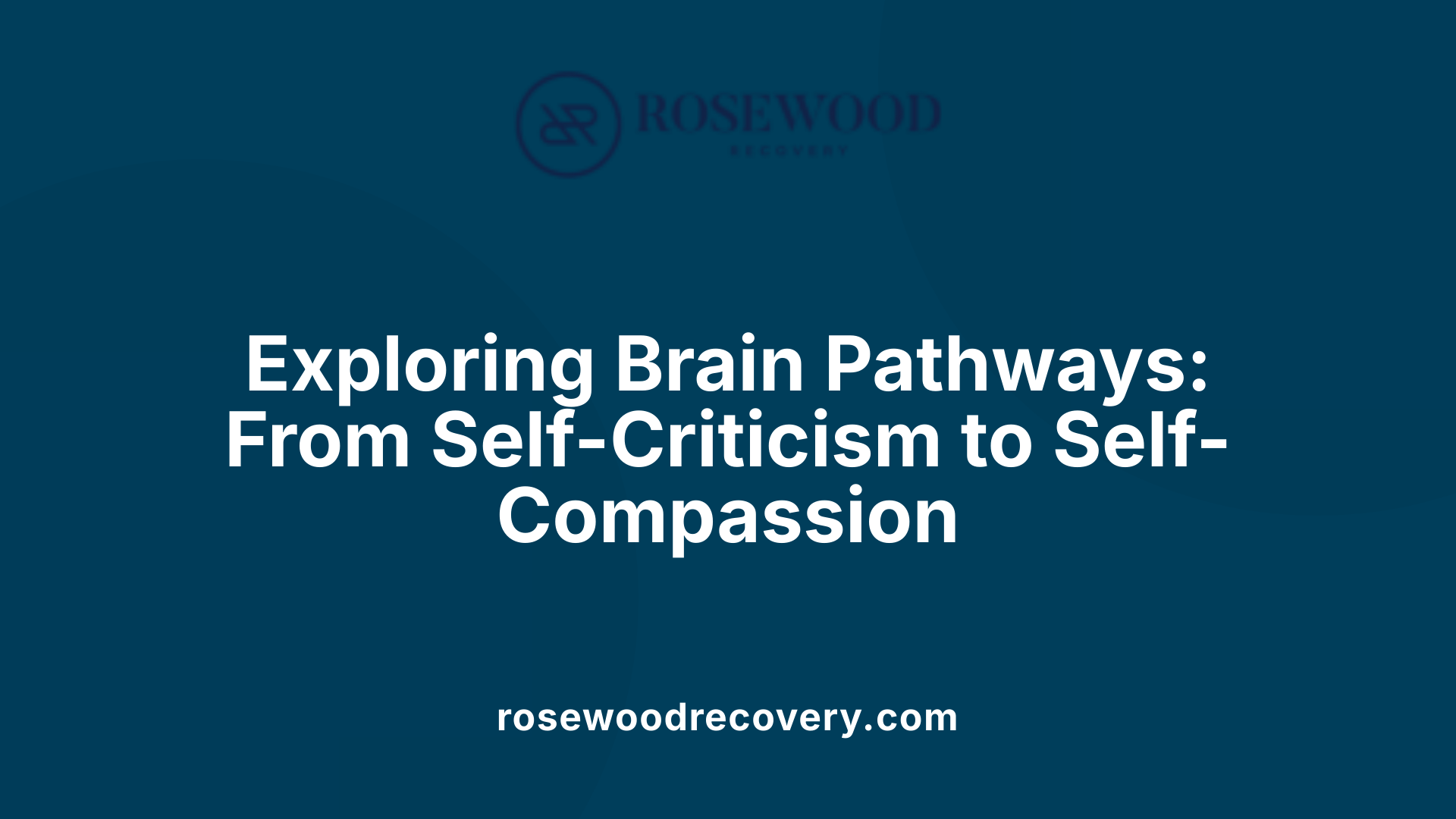Understanding the intricate connection between self-judgment and emotional suffering
The relationship between self-judgment and emotional pain is a complex interplay that shapes our mental health and resilience. Scientific research and clinical insights reveal that harsh self-criticism profoundly influences feelings of shame, trauma, and depression. By examining neural mechanisms, psychological patterns, and therapeutic approaches, this article explores how cultivating self-compassion can serve as a powerful antidote to emotional suffering, fostering healing and emotional resilience.
The Link Between Self-Judgment and Emotional Pain

What is the psychological relationship between self-judgment and emotional pain?
The connection between self-judgment and emotional pain is strongly inverse—meaning that more severe self-criticism, blame, and rejection of one's feelings tend to increase emotional suffering. When individuals harshly judge themselves, feelings of shame, inadequacy, and self-alienation deepen, intensifying emotional distress. Neurobiologically, regions such as the anterior cingulate cortex are activated during self-judgment, particularly when individuals process their perceived errors or shortcomings. Such neural activity sustains emotional pain, making recovery more difficult. Conversely, practicing self-compassion—approaching oneself with kindness and understanding—can diminish neural signals linked to negative self-evaluation and promote emotional regulation, reducing overall distress.
How does self-judgment impact emotional well-being, including shame, trauma, and depression?
Self-judgment plays a pivotal role in emotional health by shaping how individuals perceive and respond to their experiences. Negative self-judgment heightens feelings of shame and trauma, often leading to or exacerbating depression. For example, self-critical thoughts tend to activate brain regions involved in emotional regulation and evaluation, such as the medial prefrontal cortex, which can reinforce feelings of worthlessness and hopelessness. On the other hand, positive self-judgment and self-compassion are linked to better mental health outcomes, fostering resilience and emotional stability. Recognizing shared human experiences — as opposed to feeling isolated — can mitigate the effects of shame, helping individuals heal and regain emotional balance.
What does scientific research say about the connection between self-judgment and emotional suffering?
Research consistently shows that high levels of self-criticism and negative self-judgment correlate with increased emotional suffering, including symptoms of depression, anxiety, and trauma. Neuroimaging studies reveal that regions like the anterior cingulate cortex and amygdala—which are involved in error detection and fear responses—are hyperactive during self-critical states. These neural patterns contribute to a cycle of negative self-evaluation and emotional pain. Therapeutic approaches such as mindfulness, Compassion-Focused Therapy (CFT), and Acceptance and Commitment Therapy (ACT) effectively reduce self-judgment by modulating activity in these brain areas. These interventions support individuals in developing compassionate self-views, which serve as buffers against emotional distress and foster resilience.
What psychological mechanisms and neurobiological processes are involved in self-criticism and emotional distress?
Self-criticism involves activating neural circuits associated with error processing and threat detection, including the dorsal anterior cingulate cortex, the lateral prefrontal cortex, and limbic regions like the amygdala. This neural activation heightens feelings of threat and emotional pain, contributing to persistent negative mood states. Meanwhile, positive self-reassurance activates distinct brain areas such as the ventrolateral prefrontal cortex and insula, which are linked to compassion and emotional regulation. These neural pathways suggest that self-critical thoughts reinforce distress, while self-reassuring thoughts promote resilience. Psychological mechanisms linking these neural processes include automatic negative thoughts, rumination, and avoidance behaviors, which perpetuate emotional pain. Cultivating self-compassion can shift neural activity, reducing self-critical signals and fostering calm, supportive responses.
How do self-compassion and self-coldness influence emotional healing and coping?
Self-compassion encourages emotional healing by promoting kindness, understanding, and mindfulness towards oneself during suffering. This approach helps reduce harsh self-judgment and shame, facilitating emotional regulation and resilience. Recognizing common humanity—acknowledging that suffering is part of the shared human experience—relieves feelings of isolation and enhances social connectedness, which are essential for recovery.
In contrast, self-coldness—characterized by self-criticism, hostility, or emotional withdrawal—exacerbates emotional pain. It impairs the ability to process and recover from trauma or setbacks, leading to increased feelings of loneliness and exhaustion. Clinical studies show that higher levels of self-compassion associate with reductions in anxiety, depression, and stress, whereas self-coldness correlates positively with emotional suffering.
What are the main insights from clinical and research-based studies on how self-judgment influences emotional pain?
Research indicates that reducing self-judgment can significantly alleviate emotional pain, notably in depression and chronic pain contexts. Therapeutic interventions like mindfulness and self-compassion training often focus on cultivating acceptance and reducing automatic negative thoughts. Studies reveal that individuals with higher self-compassion experience less mental pain and better emotional resilience. Psychological models suggest that self-judgment influences mental health outcomes by reinforcing negative thought patterns and emotional responses, which can be mitigated through targeted therapies. Neuroimaging findings support these models, showing decreased activity in error-monitoring regions when individuals engage in self-compassion practices.
How do shame and self-criticism affect mental health and recovery processes?
Shame and self-criticism impair mental health by fostering feelings of worthlessness, guilt, and low self-esteem. These emotions can lead to cycles of rumination and avoidance, which hinder recovery from psychological issues. Shame particularly encourages social withdrawal or self-isolation, complicating therapy or social support seeking. Addressing shame and self-criticism via compassion-focused approaches can promote healing and resilience. Developing a gentle, accepting attitude toward oneself helps to break destructive emotional cycles and supports psychological growth, enabling more effective recovery from mental health challenges.
Neuroscience of Self-Judgment and Compassion

What psychological mechanisms and neurobiological processes are involved in self-criticism and emotional distress?
Self-criticism involves activation of neural circuits associated with error processing, threat, and emotional pain. These include the lateral prefrontal cortex (especially Brodmann areas 45 and 9), dorsal anterior cingulate cortex, striatal regions like the caudate, and limbic areas such as the amygdala and hippocampus. Activation of these regions heightens emotional distress and promotes persistent negative self-evaluation.
Neurobiologically, this pattern reflects an increased engagement in maladaptive self-evaluative and inhibitory processes, which can contribute to mood disturbances like depression and anxiety. Conversely, self-reassurance activates different neural pathways—engaging the left temporal pole, insula, and ventrolateral prefrontal cortex—to foster emotional regulation and resilience.
This dynamic indicates that when self-criticism dominates, an individual’s brain responds with heightened emotional pain and self-critical thoughts. Developing self-compassion can help shift this neural activity toward regions involved in positive emotional regulation, reducing distress over time.
Understanding these mechanisms highlights the importance of targeted interventions aiming to modify neural circuit activity, such as mindfulness and compassion-focused therapies, to alleviate emotional suffering associated with self-criticism.
How do brain regions involved in self-referential processing relate to self-judgment and compassion?
Self-referential processing primarily involves the medial prefrontal cortex (mPFC) and the cortical midline structures, which are active when individuals evaluate themselves or reflect on their own thoughts and feelings.
During episodes of harsh self-judgment, increased activity is observed in these regions, especially in the mPFC and anterior cingulate cortex. This heightened activity corresponds to negative self-evaluations, feelings of shame, and self-monitoring for mistakes.
In contrast, engaging in self-compassion activates regions such as the left temporal pole, insula, and ventrolateral prefrontal cortex. These areas are associated with processing empathy, emotional regulation, and compassionate responses.
Neuroimaging studies suggest these regions operate in a balanced, dynamic manner. When a person fosters self-kindness and compassion, there is a downregulation of self-critical circuits and an upregulation of compassion-related pathways.
Importantly, neuroplasticity implies that repeated practice can enhance these compassionate pathways, leading to more positive self-evaluations and reduced emotional distress over time.
What is the role of neuroplasticity in changing self-related neural pathways?
Neuroplasticity refers to the brain’s ability to reorganize itself by forming new neural connections throughout life. This capacity is fundamental for modifying self-related neural pathways influenced by experience, practice, and therapy.
Through mindfulness practices, self-compassion training, and behavioral interventions such as Compassion-Focused Therapy (CFT) and Acceptance and Commitment Therapy (ACT), individuals can induce neural changes.
These changes include decreased activity in regions associated with negative self-judgment like the medial prefrontal cortex and anterior cingulate cortex, alongside increased activity in areas involved in compassion and emotional regulation, such as the insula and ventrolateral prefrontal cortex.
Research supports that sustained mental training can produce lasting rewiring of these circuits, promoting resilience and healthier self-processing. This neuroplasticity provides a biological basis for the effectiveness of compassion-based interventions in reducing emotional distress linked to self-criticism.
How does self-criticism influence neural pathways related to emotional regulation?
Self-criticism impacts neural pathways by activating circuits involved in error detection, threat assessment, and emotional pain. Regions heavily engaged include the dorsal anterior cingulate cortex, lateral prefrontal cortex, amygdala, and striatum.
Persistent self-critical thoughts reinforce activity in these areas, which process negative emotions, leading to heightened emotional distress and mood instability. This pattern can contribute to a cycle of rumination, avoidance, and depressive symptoms.
However, engaging in practices like self-reassurance and compassion can modify these pathways. These positive strategies tend to reduce activity in self-critical regions and enhance functioning in neural circuits associated with emotional regulation—such as the ventrolateral prefrontal cortex and insula.
Such neuroplastic changes help individuals manage negative emotions more effectively, decrease vulnerability to mood disorders, and foster greater resilience. Implementing therapeutic approaches that target these neural circuits can diminish the impact of self-criticism on mental health.
This understanding of the neural underpinnings of self-judgment and compassion informs intervention design and highlights neuroplasticity's potential to foster healthier self-relations. Continued research will deepen insights into how these brain mechanisms contribute to overall emotional well-being and resilience.
Towards Compassionate Self-Understanding and Healing
Understanding the profound impact of self-judgment on emotional pain underscores the importance of integrating compassion-based approaches into mental health practices. Neurobiological evidence affirms that cultivating self-compassion can actively rewire neural pathways, diminishing the activation of regions associated with emotional distress. Clinically, interventions like mindfulness, self-compassion training, and therapies such as CFT and ACT have proven effective in reducing self-criticism, alleviating shame, and promoting resilience. As research continues to illuminate the interconnectedness of psychological mechanisms and neurobiological processes, it becomes clear that nurturing kindness towards oneself is not only a compassionate ideal but also a scientifically grounded pathway toward emotional healing and psychological well-being.
References
- Exploring the Relationship between Self-Compassion and ...
- From Self-Judgment to Compassion
- A Close Examination of the Relationship Between Self- ...
- Self-Judgment - an overview
- Review The self in pain
- Self-compassion, pain, and breaking a social contract
- A Pilot Study Using a Compassionate Writing Intervention ...




